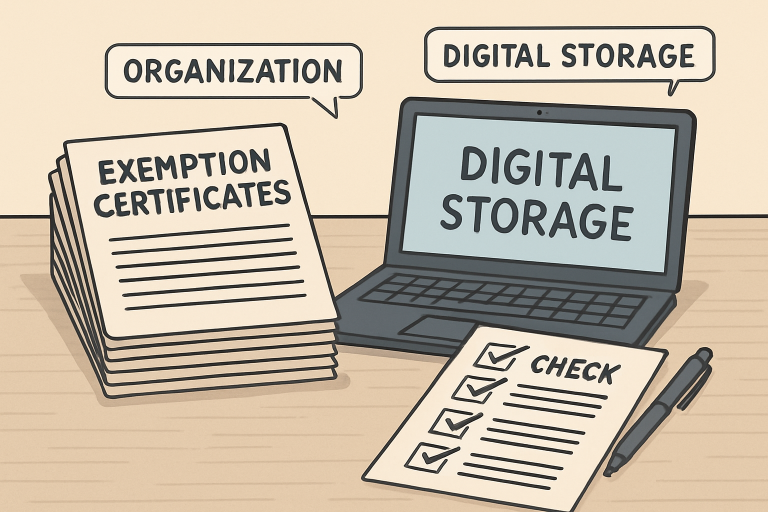What Is A Sales Tax Exemption Certificate?
Navigating exemption certificates requires diligence and a step-by-step approach, particularly as state tax agencies frequently update their processes and documentation standards. Small businesses, in particular, often face confusion regarding what is exempt and how long records should be kept. According to recent reports, more companies are investing in training and technology to ensure compliance and streamline certificate management. This practice pays off by reducing the risk of audit penalties and fines.
A sales tax exemption certificate allows a business to purchase certain goods or services without being required to pay sales tax—provided those items will later be resold, or used in a way that qualifies for tax exemption. When sellers receive this document, they’re assured that a sale qualifies for exemption under state law. Regulations and required forms vary by state, making it crucial for multi-state businesses to track compliance carefully. To begin leveraging these savings, companies often need to apply for a reseller certificate with the state’s revenue agency, proving their eligibility for tax-free purchasing on qualified items.
Securing proper exemption certificates is crucial to avoid unnecessary taxes on resale inventory, which can raise costs and impact profitability. As businesses expand across states, understanding each state’s policies on certificate submission and retention helps maintain smooth operations and prevent unexpected tax issues. Choosing the right sales tax exemption strategy is essential for efficient purchasing and cash flow. Experienced owners audit records regularly, while newcomers should learn how to obtain, present, and store exemption documents. Staying informed prevents penalties and supports sustainable growth and expansion.
Why Do Businesses Need Sales Tax Exemption Certificates?
Businesses need sales tax exemption certificates to purchase inventory or raw materials without immediately incurring sales tax, assuming the purchases are for resale or otherwise exempt use. Without these certificates, companies would have to factor in the additional sales tax cost every time they restock, putting them at a cost disadvantage. This is particularly true for wholesalers, distributors, and retailers, for whom margins can be slim. These certificates reduce operating expenses and foster accountability, as any misapplication of exemptions can expose businesses to audits and the potential for hefty fines or back taxes.
Common Mistakes With Sales Tax Exemption Certificates
Many businesses fall into the trap of mismanaging exemption certificates, especially as compliance rules grow more complex across multiple jurisdictions. Common mistakes include accepting expired certificates, missing signatures, or failing to verify the legitimacy of buyers. Sometimes, crucial information like correct business names, addresses, or tax ID numbers is omitted, rendering a certificate invalid in an audit. Even large companies fall prey to paperwork errors, underscoring the need for tight administrative controls and regular training.

Best Practices For Managing Certificates
- Digitize all exemption certificates and store them in a secure, easily searchable system.
- Implement regular reviews to identify and replace expiring or missing certificates.
- Verify the authenticity of each certificate directly with relevant state tax authorities, particularly when onboarding new customers or suppliers.
- Educate your team regarding state-specific certificate requirements and update them as legislation changes.
- Maintain a transparent document trail for all transactions, ensuring swift response in the event of an audit.
Steps To Obtain And Use A Sales Tax Exemption Certificate
- Research the requirements for each state where your business operates or conducts transactions.
- Locate and download the proper exemption certificate form from the state’s Department of Revenue website.
- Accurately fill out all necessary information, including your business name, address, tax ID, and type of exemption claimed.
- Present the completed certificate to the supplier at the time of purchase, before the transaction is finalized.
- Keep organized records of all certificates submitted and received for at least the duration of your state’s statute of limitations—often three to seven years, as most state revenue agencies recommend.
How State Variations Affect Compliance
Each state features its tax laws and exemption certificate formats, making compliance a moving target—especially for businesses selling across state lines or online. While some states use standardized documents under the Streamlined Sales and Use Tax Agreement (SSUTA), others require unique forms and renewal schedules. Exemptions can vary: some states exempt groceries, others do not; some tax certain services, while others spare them. Keeping pace with these changing requirements may involve subscribing to official state tax bulletins, utilizing specialized tax compliance software, or consulting with experienced legal professionals.
Practical Tips For Avoiding Penalties
Penalties for improper certificate handling are both severe and avoidable. Regular internal audits of exemption certificate files help ensure nothing is missing or expired. Empower your sales and purchasing teams to confirm documentation before completing transactions. Make the most of digital solutions that provide reminders about upcoming expiration dates, so renewals are never overlooked. Above all, treat compliance as a business discipline—not a paperwork chore—to safeguard your financial health and reputation.
Conclusion: Embracing Smart Tax Practices For Growth
Sales tax exemption certificates aren’t just formalities—they’re critical for effective cost management and legal compliance. Businesses that master certificate handling are more resilient in audits, better poised for expansion, and able to redirect financial resources toward growth. Prioritize compliance, stay abreast of changes in state tax law, and rely on reputable resources for ongoing guidance. Doing so turns the challenge of tax law into an opportunity for operational excellence and competitive advantage.




Leave a Reply